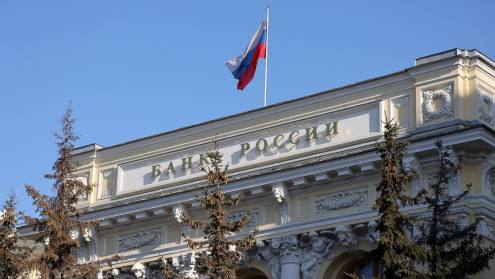At the end of March, the state-owned Vnesheconombank (VEB) formerly took over management of the state pension fund (SPF), on which most Russians rely for income in their old age.
Set up in Soviet times, but separated from the Central Bank of Russia (CBR) seven years ago, VEB is the Kremlin’s main interface with the financial world and handles Russia’s Eurobonds, pays the state’s foreign obligations and collects debts to the state, among other duties.
Some have criticised the handover to VEB of responsibility for managing pensioners’ money, afraid that state banks won’t be as efficient as managers as they are as investment specialists, but VEB’s young chairman, Vladimir Chernukhin, was triumphant on the eve of taking up this new role.
Fixing the profits
Until March VEB had been handling only the hard currency part of the SPF’s money, but from April it will also manage the rouble funds. Under Russian law, only cash can be transferred to state organisations, so the bank sold off its whole Eurobond book, in which all the money had been invested, to fix the profits in readiness to transfer the funds to the new legal entity created to manage them.
“We had to fix our profits for last year, and the results are nothing short of sensational,” said an ebullient Mr Chernukhin, who took over the bank last year. “VEB returned a profit of 31.5% on $1.7bn worth of assets in 2003. That is a net profit for the SPF of about half a billion dollars, and this in a year when the average market return on Eurobonds was only a little more than 6%.”
The bank will get another Rbs100bn ($3.5bn) in rouble assets from the beleaguered SPF, which has barely been able to cover pension payments in the last few years. Life has become easier in recent years as the state budget moved into surplus, but the demographic problems faced by the rest of Europe have been exacerbated by the collapse of the Soviet Union.
More investments
The money will be invested into sovereign treasury bills or Eurobonds, and Mr Chernukhin hopes the bank’s success in 2003 will go some way towards allaying the fears of his critics. Certainly after spending a decade lurching from crisis to disaster, an unexpected $500m will be more than welcome.
VEB’s success with its pension portfolio is part of Russia’s creeping bank reform, as the emphasis is on market operations rather than state operations. Mr Chernukhin boasts that although the bank has dumped all its commercial business, it is more profitable than ever.
In the years after the crisis, VEB built up a significant commercial portfolio, playing on its state-owned status and size to cater to the needs of the privately owned natural resources companies. But as part of President Vladimir Putin’s reforms, Mr Chernukhin was brought in to remake the institution as a government bank and has since ditched this business.
Bottom line is fine
But the change doesn’t seem to have done much damage to VEB’s bottom line. The bank earned more than $120m in 2003, the largest profit since it became independent from the CBR in 1996. The return on capital was 40% and the return on equity 2%, better than many of Russia’s leading commercial banks, most of which came from Eurobond operations.
“Since we stopped operating as a universal commercial bank, our assets and profits have doubled,” Mr Chernukhin continues. “This is partly due to Russia’s general economic growth, but mostly to us turning this growth into money.”
Public image boost
The bank’s standing abroad has also improved. For most of the last decade, VEB has worn two hats at meetings of the Paris Club of sovereign creditors – that of a debtor and creditor. However, since Russia’s loans were restructured in 2000, VEB spends its time at the club as a creditor and last year collected $1.5bn in Soviet-era debts. At the same time, VEB was responsible for making Russia’s $10bn in debt repayments last year, a peak year when several hefty sovereign debts put off from the 1998 crisis came due.
This year, Russia’s new export promotion bank goes into operation; it will be supervised by VEB, the major shareholder. Earmarked in this year’s budget is $500m to support exports in the same way that US Eximbank supports American exports. One document detailing country risks and quotas needs to be approved before work can begin. Mr Chernukhin says VEB already has $500m worth of projects lined up – mostly machinery exports – and more will come after they begin operations.
“We have signed agreements with all the leading export agencies, and the concept has already been approved by the government,” he says. “Now our companies will be able to compete on the international markets on an equal footing with those of the rest of the world.”











